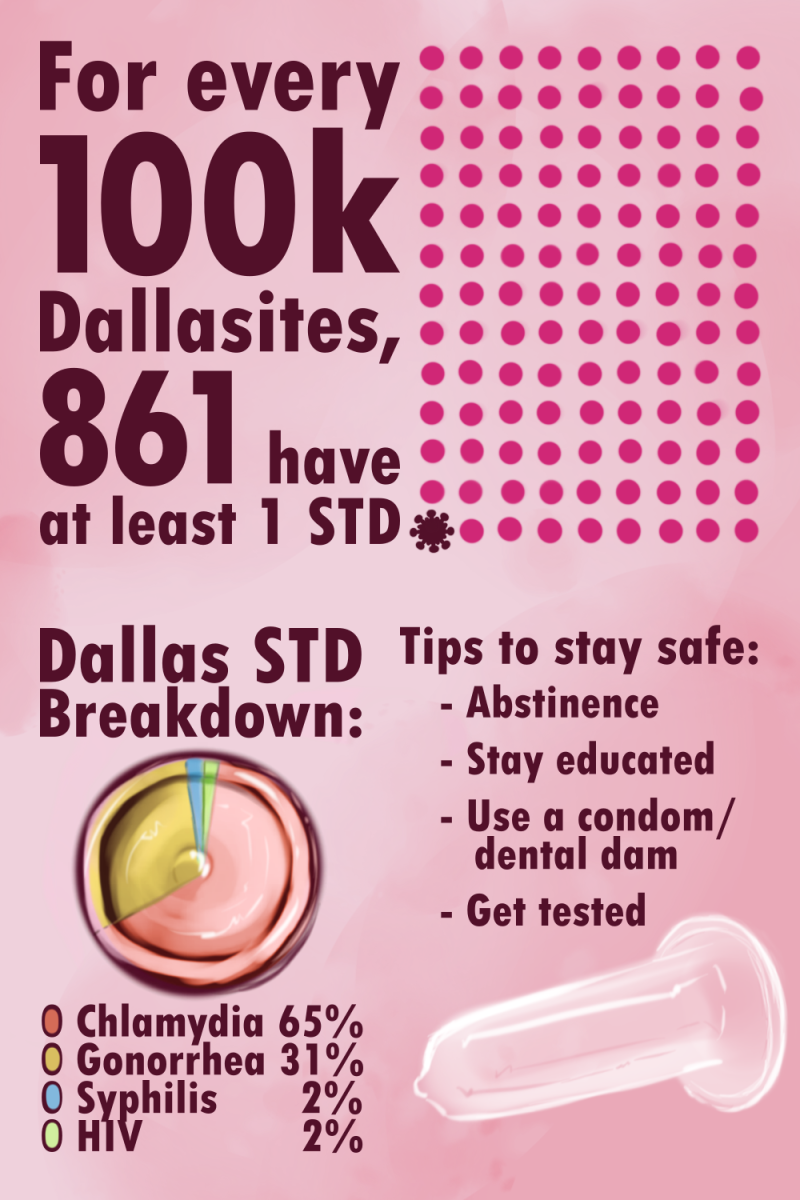A recent study from Innerbody Research found that Dallas ranks No. 50 in the top 100 U.S. cities with the highest rates of STDs. To stay safe from high rates of STD transmission, Comets can take advantage of the resources provided by UTD’s Health Center and Student Wellness Center, like condoms and HIV testing.
Innerbody is a think tank comprised of researchers, scientists and medical professionals whose mission is to provide science-based information about different health concerns in the U.S. The recent study looked at transmission rates per capita and found that the South accounted for a disproportionate number of STD cases; eight out of the top 100 cities were located in Texas. Chlamydia and gonorrhea have both increased to pre-2020 levels. Eric Rodriguez, CEO and co-founder of Innerbody, said that a major factor in why sexually transmitted diseases are so prevalent has to do with the lack of sex education.
“Another major factor that is very relevant to college-age students is the stigma in cultural factors behind STDs,” Rodriguez said. “It’s something that is kind of out of sight, out of mind. Younger people do not really feel comfortable with speaking to their doctors.”
Austin Rupert, assistant director for the Student Wellness Center, said he was not surprised by this due to the social and legal factors that affect STD transmission.
“When it comes to Texas, obviously we have new laws that can make it more difficult for people to secure health-related resources,” Rupert said. “On top of that, in our K-12 schools inclusive sex education is not really a priority. And so a lot of those things play into as to why those rates may increase.”
There are 861 cases of STDs for every 100,000 people in Dallas, compared to 663 in McAllen. Of the Dallas population, there are 1,034 HIV cases, 29,162 cases of chlamydia, 13,754 cases of gonorrhea and 1,085 cases of syphilis. Eight Texas cities (including Dallas) are ranked in the top 100 highest-transmission cities. These cities include Laredo, San Antonio, Corpus Christi, Austin, Houston, McAllen and El Paso.
Rodriguez said college students are most at risk of contracting diseases through sexual contact, due to a lack of sex education and little emphasis on healthy sexual practices in healthcare and media.
“It is the time in life where people become more sexually active and have a higher frequency of having multiple partners, and so that combined with what’s been dubbed by the media as ‘hookup culture’ is why that age group [college students] is very vulnerable to STDs,” Rodriguez said.
Rupert said knowledge and education about STD prevention is critical to preventing STDs. Physical contraceptives – such as male and female condoms – are the first line of defense when protecting yourself from transmitting or receiving STDs while having sex. Rodriguez said that while safe sex is important, abstinence is the only way to be 100% safe from STDs.
“The evidence has shown that using a condom is the safest thing you can use,” Rodriguez said. “That being said, there’s no 100% guarantee and that’s why it’s so important to get tested. If you are sexually active, then making sure that a condom is used is probably the single most important thing you can do and making sure it’s used all the time.”
The UTD Student Wellness Center offer condoms and dental dams to students free of charge. In addition to that, UT Southwestern conducts free HIV testing three times a semester on campus. The UTD Health Center also conducts testing year-round at a heavily discounted price for students.
According to both Rupert and Rodriguez, there’s still a stigma surrounding STDs and sex which makes talking about sexual practices uncomfortable. However, they emphasize that having honest conversations about this topic will help normalize it and encourage individuals to access resources to maintain their sexual health.
“Luckily, we live in an age today where many of these are manageable diseases where you can live,” Rodriguez said. “It’s not a death sentence by any means.”
UTD will be hosting “Sex Week” during the week of Valentine’s Day, with events geared to reduce stigma against STDs and make students feel comfortable to seek medical help and practice safe sex.
“It’s very important to do the work to be sex-positive and have sex-positive conversations,” Rupert said. “Someone who may have tested positive for an STD is not dirty. They’re not less than any other person. They deserve to live happily and healthily.”





